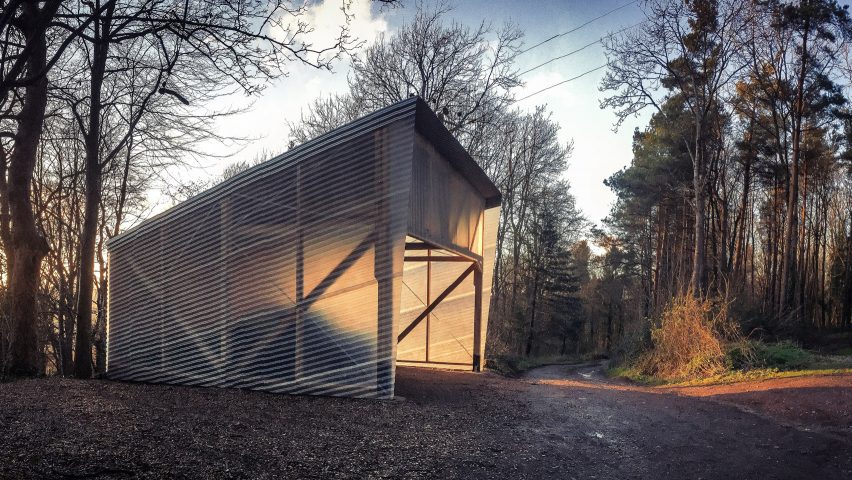British practice Invisible Studio has completed a model-making shed beside its self-built studio in the Bath woodland, using a combination of timber grown and milled on site, and corrugated fibreglass.
The Ghost Barn will be used for prototyping full-sized structures at Invisible Studio's growing research facility in southwest English, where it accompanies a studio built from recycled materials and a long-drop composting toilet.
As with the previous structures, Invisible Studio-founder Piers Taylor recruited a team of unskilled volunteers and friends to help build the workshop, which was completed in under two weeks.
"We enlisted the same group of originally unskilled neighbours in my valley who over the course of a number of projects we've done here at Invisible Studio have developed really good carpentry skills," Taylor told Dezeen.
"They include my retired neighbour Alan Matthews, his digger driver brother Cuffer, their friend Bernard Twist and our woodsman Simon Schofield who is also a trapeze artist."
The team produced just a few drawings before construction started, leaving much of the design to be determined during the build, but the architects chose the materials and form to reference local agricultural sheds.
The structure is made from unseasoned spruce timber and its mono-pitched roof tilts upwards to create an opening at the front for large models to be moved in and out.
Impact-resistant fibreglass clads the walls, allowing plenty of natural light inside and revealing the wooden structure on the outside, while corrugated steel forms the roof.
As well as providing shelter for full-scale test structures, the pavilion will also host the studio's design-and-make workshops. This includes the annual Studio in the Woods, where groups of students test ideas through making at 1:1 scale.
Invisible Studio founder Piers Taylor previously worked with students from the Architectural Association's Design & Make programme to produce a faceted timber building in the school's Hooke Park forest campus, which is used as an assembly and prototyping workshop. This year's students added to the school's woodland facilities by constructing a robotically fabricated barn.
Other projects by Invisible Studio include a pair of woodland maintenance buildings in the National Arboretum in Gloucestershire, England made with trees felled in the routine maintenance of the estate.
Project credits:
Design and build team: Piers Taylor, Alan Matthews, Simon Schofield, Bernard Twist, Cuffer Matthews, Ed Strutt, Martin Osbourne

